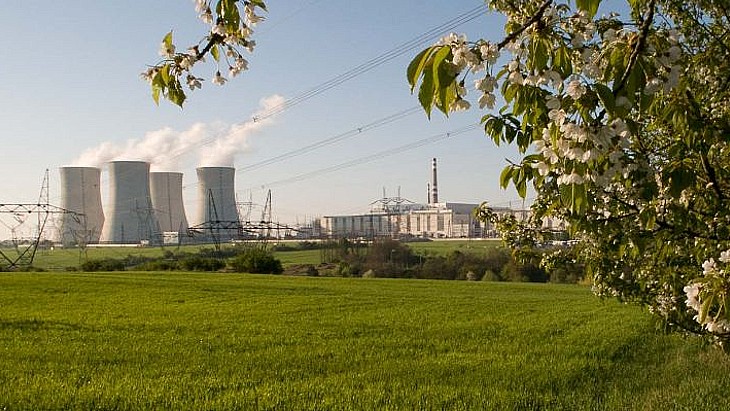The Czech Ministry of Trade and Industry said: "The country has already obtained EC approval for state aid for one unit in the past, but after the decision to build two units, it must apply for an extension of the approval for public support to the sixth unit (there are four existing Dukovany units). As part of the notification, the Commission will assess the compliance of the proposed support with European Union rules. Providing public support for this project is necessary, as it is in other countries or for other low-carbon sources."
Minister of Industry and Trade Lukáš Vlček said the submission had come "after weeks of intensive negotiations and preparations between my team and the European Commission". He said: "We have already overcome hundreds of obstacles, many more are still ahead of us, and obtaining notification is essential for the successful continuation of the entire project. The issue of notification was also the subject of my discussions with European Commission Vice-President Teresa Ribera in Brussels this week. We expect the Commission's final approval by the end of 2026."
A European Commission spokesperson said: "We can confirm that this measure was notified. The Commission is assessing it according to standard procedures."
The Czech Republic currently gets about one-third of its electricity from the four VVER-440 units at Dukovany, which began operating between 1985 and 1987, and the two VVER-1000 units in operation at Temelín, which came into operation in 2000 and 2002.
Background
In October 2023, Westinghouse, EDF and Korea Hydro & Nuclear Power (KHNP) submitted binding bids for a fifth unit at the Dukovany nuclear power plant, and non-binding offers for up to three more units - another one at Dukovany and two at the Temelin nuclear power plant. Westinghouse was proposing its AP1000, EDF was proposing its EPR1200 reactor, KHNP was proposing its APR1000. But in February 2024 the Czech government announced it was changing the tender to be binding offers for four new units, with Westinghouse not included because it "did not meet the necessary conditions".
Prime Minister Petr Fiala explained at the time that the decision to switch to binding offers for all four units was the result of the original tender suggesting that contracting for four units, rather than having separate processes, could have a 25% benefit in terms of costs. In July 2024 he announced KHNP as the preferred bidder, with contract negotiations to begin. He said the winning tender "based on the evaluation of experts, offered better conditions in most of the evaluated criteria, including the price". The KHNP bid was for a cost of around CZK200 billion (USD8.6 billion) per unit, if two units were contracted.
The contract, for two new units, was signed in June this year following the culmination of legal challenges by EDF, whose objections to the tender process included the belief that the KHNP offer price and the inclusion of a guarantee that the construction would not be delayed or become more expensive, would be "unfeasible without illegal state aid given the prices in the nuclear industry". EDF says that if their rival bidder had state support it would breach European Union rules. KHNP rejected EDF's claims and said "we emphasise that we have not received any subsidies that could damage or distort fair competition in relation to the project".
The European Commission approved the Czech Republic's proposed public support package for the first new unit - fifth overall - at Dukovany, in April 2024 - after a series of modifications were made to address their concerns during an inquiry which began in June 2022.
The Czech Republic plans to grant direct price support in the form of a power purchasing contract with a state-owned special purpose vehicle, ensuring stable revenues for the planned new nuclear unit at Dukovany for 40 years, with a subsidised state loan to cover a majority of construction costs as well as a "protection mechanism against unforeseen events or policy changes".
The European Commission (EC), in announcing its decision, said that to "ensure that the aid is proportionate and does not unduly distort the functioning of the electricity market" the country had "introduced a remuneration formula akin to a two-way contract-for-difference, which provides revenue stability and limits excess remuneration through a yearly ex-post settlement". This effectively means that if electricity prices are below the agreed level, the nuclear project will receive a subsidy to make it up to the agreed price, and if electricity prices are above the agreed price, the nuclear project would pay money back to the government.
The EC also said the period of direct price support had been cut from 60 years to 40 years and the strike price was being set "on the basis of a discounted cash flow model ensuring that the total aid amount, taking into account the subsidised loan, is limited to the funding gap of the project ... EDU II's shareholders will get a rate of return equal to the market return that investors would require on a similar investment".
There will also be a clawback mechanism lasting for the operational lifetime of the plant to ensure "additional gains generated by the project will be shared with the Czech state" and "to avoid market concentration and remove the risk that the measure provides an advantage to certain electricity consumers, Czechia has committed to ensure that at least 70% of the power output will be sold on the open power exchange - namely, day-ahead, intraday and futures markets - over the entire lifetime of the power plant. The rest of output can be sold on objective, transparent and non-discriminatory terms by way of auctions".






_55401.png)
_23009.jpg)







